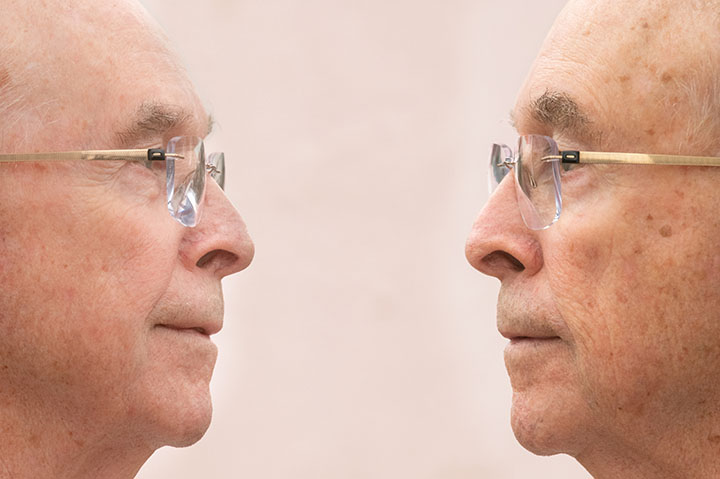 Six months before his retirement, Dr. Ken Garren had an interview interrupted by a loud, grinding noise above him. Like a dentist’s drill, times 100. The furniture hummed.
Six months before his retirement, Dr. Ken Garren had an interview interrupted by a loud, grinding noise above him. Like a dentist’s drill, times 100. The furniture hummed.
Garren laughed at first, but after another disruption, he jumped to his feet and dashed out his office door like Clark Kent looking for a phone booth.
He returned a minute later. “They say they’re almost done,” he said.
The 79-year-old university president had run up two flights of stairs, talked to workers doing a renovation, and come back unwinded.
Garren didn’t sound like someone on the verge of retirement either. He had just returned from a trip to Florida, where he attended a conference and asked two donors to support upcoming projects at the University of Lynchburg. Meanwhile, he was scheduling meetings with senators and representatives for an upcoming trip to Washington, D.C.
In the interview, he named one project after another. Diversity programs, fundraising, and public policy issues. A partnership to educate nurses for a rural hospital. A stronger collaboration with a pharmacy school.
Most of the projects will be far from finished when he retires. But he doesn’t believe in losing momentum.
“I’m trying to think of the important things to do, and I can’t think of anything that’s not important,” Garren said. “I’m pushing hard on the accelerator. I’m trying to accomplish as much as I can.”
Garren is retiring this summer after 19 years at the helm, and his sprint to the finish is no surprise to those who know him well. Students, faculty and staff, alumni, and others describe him as full of energy, passion, and heart — someone who has devoted his time and talent to making Lynchburg College, now University of Lynchburg, a better place for students and society.
“Ken saw a lot of potential here that perhaps other administrators had not,” Dr. Allison Jablonski, provost, said. “In the admissions world, we had heard, ‘Lynchburg is the best-kept secret.’ He didn’t see a reason to keep it a secret anymore.
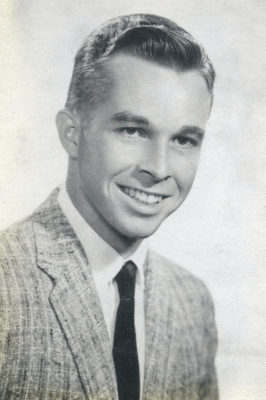
“Ken’s vision has been that we can expand and still provide a high-quality experience for students, faculty, and staff. It’s not growth in numbers only. It’s still maintaining the same environment and ethos of Lynchburg. The same feeling of family and home.”
Roots
Garren was born in Augusta, Georgia. His family moved to several cities in the Carolinas and Virginia as he grew up, settling in Roanoke for his last two years of high school. His father drove buses for Atlantic Greyhound and dreamed that his sons would follow in his footsteps.
The world changed for Garren when his older brother, Johnny, received a scholarship at the University of Richmond. Garren realized that the family’s meager income didn’t need to limit the dreams he had for himself.
“I felt that there was a way out of poverty, and there was a way to achieve,” Garren said. “I felt that there was hope in education, and that’s what drove me.”
Garren went to Roanoke College. He said the liberal arts education he received there spurred new thoughts about civil rights and respect. He started speaking up more when his father made racist remarks.
“It was a liberal arts education that changed me,” he said. “My background, in terms of what I was hearing within the family culture, was not the right one to hear. I resisted it, even before I was in college, but [education] made me understand what was right and what was wrong.”
The stark contrasts between his and his dad’s philosophies created friction at home. Garren choked on his words as he described memories of doing his college homework: He’s sitting on his bed puzzling through math problems. The bedroom door opens. His father laughs and slams the door shut.
The cackling hurt, but it strengthened Garren’s resolve. “That’s one of the reasons I wanted to come here,” he said. “I thought maybe I could help students like me.”
LC love
During her senior year, Sarah Toliver ’16 interviewed Ken and Sheila Garren to learn about their love story.
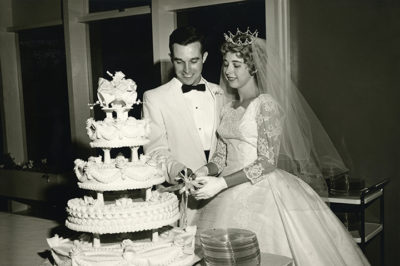
The LC LOVE sculpture, now one of the most popular photo backdrops on campus, was just an idea at that time. Toliver was supporting the idea by collecting love stories from several Lynchburg College couples, including the Garrens.
“I remember they were very excited,” Toliver said. “They’re so much in love, like they just met. It’s a genuine love story. It’s real.”
Ironically, it’s a love story that started in Lynchburg, or close to it.
Ken Garren’s family moved to Roanoke, Virginia, just before his junior year of high school. It was too late in the year to try out for the William Fleming High School football team, so he became a spectator. He bought a ticket for a bus taking Fleming students to Lynchburg to watch their football team play E.C. Glass High School.
As the bus left Lynchburg that night, Garren noticed a cheerleader named Sheila Johnston standing in the aisle beside him. All the seats were full. “I asked the fellow sitting beside me to move over a bit and then asked the cheerleader to sit down beside me,” he recalled. “She did as invited and my life changed forever.”
When the bus returned to their school, Johnston’s boyfriend was not there to meet her. Garren offered to drive her home.
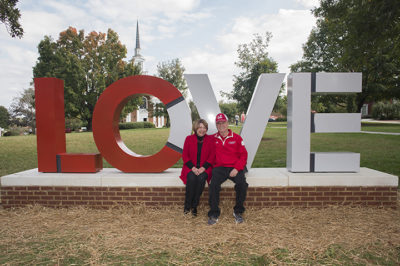 A week later, they went on a date to see the Elvis Presley movie “Love Me Tender.”
A week later, they went on a date to see the Elvis Presley movie “Love Me Tender.”
“We dated for five years and married in 1961,” Garren said.
They each pursued their own careers. He worked in the U.S. space program and then became a college professor. She taught fourth grade for 28 years. The Lynchburg College presidency combined their jobs, though.
“Coming to Lynchburg has given us the opportunity to be closer, because we do work together,” Sheila Garren said.
Toliver said she is impressed by the enduring nature of the Garrens’ relationship. One of her friends went to Homecoming this past fall and sent her a video of the Garrens dancing the Hornet Hop.
“I was like, ‘Yep! They still got it,’” she said.
Family first
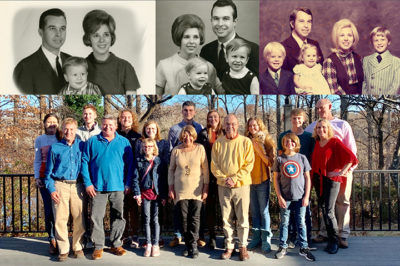 Even while pursuing multiple careers and staying active in the community, the Garrens made family a priority. They have three children — David Garren, Steven Garren, and Kristi Garren Snow — and eight grandchildren.
Even while pursuing multiple careers and staying active in the community, the Garrens made family a priority. They have three children — David Garren, Steven Garren, and Kristi Garren Snow — and eight grandchildren.
Ken Garren always celebrates his birthday with his oldest grandson, Garren Snow, whose birthday is the following day, and he frequently speaks on FaceTime with his youngest granddaughter, who is autistic. They work hard to save family time for holidays, vacations, and special performances by their grandchildren.
Education runs in the family — all three children earned doctoral degrees, and “the grandchildren are academic achievers also,” Sheila Garren said.
Mission-minded
Garren joined the Army National Guard in February 1958, as a high school senior. “I was most fortunate to begin my military service under the leadership of D-Day veterans,” he said.
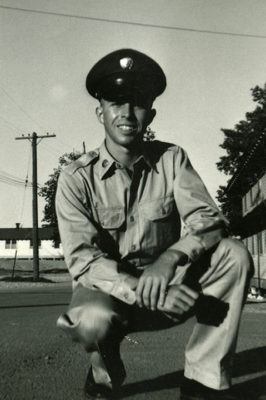
After completing his National Guard service, he joined the U.S. Army Reserve in 1976. He filled assignments ranging from public relations to data processing, but most of his work involved training. He retired with the rank of colonel.
Garren said the military taught him about leadership and teamwork. “I love that team effort. It was people working together. The officers over you were generally trying to help you move up. I like that idea of helping those around you, helping them learn.”
Those lessons also came with a sense of duty to accomplish a mission. “What’s most important? To this day, it’s the mission,” he said. “It’s to get my mission, get my job done.”
Leaving the Space Race
After graduating from Roanoke College, and while serving in the National Guard, Garren worked at NASA’s Langley Research Center for five years. He worked with engineers and rubbed shoulders with astronauts. “We were in a race with the Russians,” he said. “They had Sputnik and the first man in space. They were ahead of us, and the U.S. was really fighting hard to put the first man on the moon.”
In 1967, he left NASA to finish his PhD at Virginia Tech and become a Roanoke College professor. Back at his alma mater, Garren noticed that some of his fellow math professors were tough in their teaching and grading. But Garren thought a different approach could help students grow more.
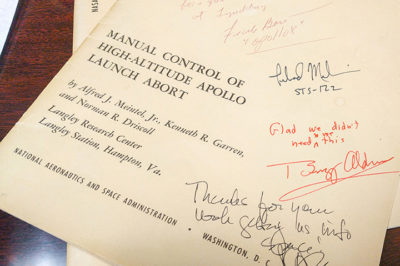
He decided to focus more time on teaching lower-level courses, such as business calculus. He wanted students who were not majoring in math to have a professor whose goal was to help them learn math and lose any fear of it.
“I realized I was probably going to be the last person to ever teach them about math,” he said. “My real pride was seeing the C-type of students, the real strugglers, move to a higher level of understanding.”
At Roanoke, Garren was known as a dynamic, student-centered professor and dean who kept students engaged in the classroom. He started a math fraternity. He led initiatives that helped commuter students. With the help of a trustee, he started an office of diversity.
When he had taught there for more than 30 years, some people on the Roanoke faculty and staff got phone calls from Dr. Ken West, a professor at Lynchburg College. West told them Garren had applied to be president of Lynchburg College, and had listed them as a reference.
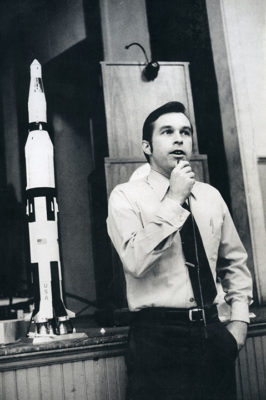
Their reaction was telling, said Walker Sydnor, a former trustee and chair of the search committee that hired Garren. “Ken [West] reported to the group that it was like a mourning when they realized [Garren] might actually leave Roanoke. We were influenced by that.”
Coming to Lynchburg
Nineteen years ago, the committee tasked with selecting the next president for Lynchburg College was a bit bored.
They had conducted nine interviews over two days in a conference room near Dulles International Airport. “We had a tremendous variety of [applicants], ranging from high-ranking military officers to very academic, solemn people,” Sydnor said.
Dr. Edward Polloway, a retired Lynchburg professor and vice president, remembers that people on the committee were “a little tired.”
Then Garren walked in for the last interview.
“You have this energy bolt that just comes flying into the room, and was so excited to be there,” Polloway said.
“He was the Energizer Bunny, just raring to go,” Sydnor added.
In the interview, Garren described a 10-point vision detailing how Lynchburg College could grow and serve students better. It was not a canned presentation. “He had studied Lynchburg College,” Sydnor said. “He actually had a very clear list of objectives, things he wanted to accomplish that he had thought out very carefully.”
Polloway recalled a very clear consensus after the interview. “If we want an energetic president, we just found him,” he said. “This person will come in and be active. He will move things.”
As soon as Garren was announced as the new president, he started making frequent visits to Lynchburg to meet community members. “We all knew him well before his tenure began,” Polloway said.
During a student awards ceremony that spring, John Eccles, then-dean of students, looked up and recognized the Garrens sitting on the back row. “Both of them were smiling the whole time,” he said. “I thought, ‘Wow, that’s pretty neat. He’s not even on the job yet, and he has this desire to assimilate himself into this community. He can’t wait to get in the game.’”
So you think he can dance?
The Hornet Hop was born because Garren won’t ask anyone to do something he isn’t willing to do himself.
In his first year as president of Lynchburg College, he was invited to speak to freshmen about the importance of school spirit. He didn’t want to just talk about it.
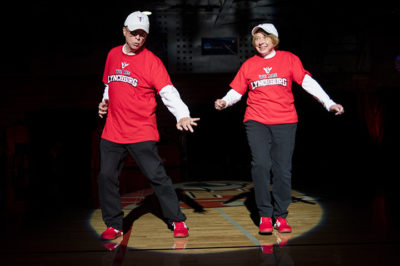 “I went back home and I told Sheila, ‘What I’d like to do is to show them school spirit, and the way we’ll show them school spirit is we’ll introduce a dance,’” Garren said. “It will be a victory dance, and we’ll call it the Hornet Hop.”
“I went back home and I told Sheila, ‘What I’d like to do is to show them school spirit, and the way we’ll show them school spirit is we’ll introduce a dance,’” Garren said. “It will be a victory dance, and we’ll call it the Hornet Hop.”
They came into Turner Gymnasium wearing Lynchburg College T-shirts, black pants, and baseball caps. They introduced the Hornet Hop and signaled for someone to start playing Will Smith’s “Wild Wild West” while they danced.
“The place went nuts!” Eccles remembered.
Word of the dance spread. Before long, the Garrens were visiting several alumni in Virginia Beach when the hostess moved her coffee table, rolled up her rug, and insisted on seeing the Hornet Hop.
A couple of years later, Dr. Todd Olsen, women’s soccer coach and health and physical education professor, took an introductory dance class to line dancing lessons at Cattle Annie’s, an event venue in Lynchburg at the time. The Garrens walked in to join the class.
The students were excited to see their college president there, and the Garrens surprised Olsen by mingling with them. “It was a really cool connection to see them come and interact with my students,” he said. “They jumped in with all four feet.”
He said Garren understands the importance of connecting with others. “He is about relationships — getting to know people where they are, whether that’s at Cattle Annie’s line dancing, or in Washington, D.C., talking to senators.”
Garren echoed that sentiment. “The students don’t care what you know until they know that you care, and they know that you care when you spend time with them,” he said.
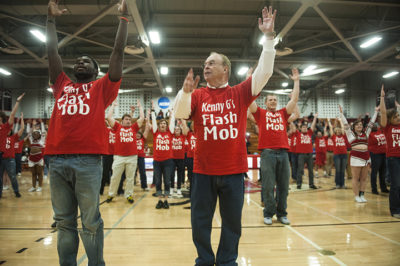 In 2013, Garren and a group of students stormed the court at halftime of a basketball game. Their T-shirts read “Kenny G’s Flash Mob.” The song “Gangnam Style” started playing, and the group performed the dance from the Korean pop music video.
In 2013, Garren and a group of students stormed the court at halftime of a basketball game. Their T-shirts read “Kenny G’s Flash Mob.” The song “Gangnam Style” started playing, and the group performed the dance from the Korean pop music video.
“It wasn’t my best dance, but it was my most enjoyable one,” Garren said, “because I was dancing with the students.”
Team leader
Dr. Sally Selden began teaching management at Lynchburg in January 2001. Almost immediately, she got another job offer from a much larger university. She was going to take the job.
But then the soon-to-be president called her.
“He convinced me to stay,” Selden said. “This is a person who had a vision for the institution. He was committed to the graduate program. A lot of his vision was focused on the student experience. I trusted him.”
Selden, who worked at Lynchburg for 18 years and ultimately became provost, said Garren led Lynchburg by building a team and empowering those who worked for him. “He saw the best in others, and he created the circumstances where they could exercise their skills,” she said.
Garren said he tried to fill his team with people who had passion as well as talent. “What I’m looking for is people who will be champions in whatever they’re doing,” Garren said. “Not just the ability to do the job, but they have to be champions.”
Polloway was one of the first champions Garren put on his team. In 2001, the graduate programs were “waning,” Polloway said, and some people even said the College should drop them. Garren asked Polloway to reverse that direction.
Polloway grew enrollment in the existing programs and led the development of new ones. In 2010, the College launched its first doctoral program in health sciences. Since then, enrollment in graduate studies has grown from 150 students to about 1,000.
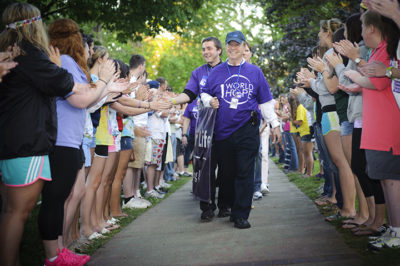
Garren also asked Dr. Edward DeClair to run the Westover Honors program, which had only 26 students in 2002. Thanks to DeClair’s development of the program, more than 200 students are enrolled in Westover Honors College today.
“Each step of the way, Ken has been a real champion of honors education at Lynchburg,” DeClair said.
More recently, Garren promoted Aaron Smith ’05, ’07 MEd, ’18 EdD twice — first to diversity and inclusion officer, and then to vice president and dean for student development. “Both of them were tall tasks,” Smith said, but the president’s confidence helps. “It does create a sense of expectation. I know what I’m capable of, but knowing that he has so much confidence in me, I want to do right by him, as well.”
Nathaniel Marshall ’83, chair of the board of trustees, said Garren’s team building, among the administration, faculty, and on the board, has been critical. “You can be a great president, but if you’re doing all the work, that’s tough,” Marshall said. “He was able to make some great selections of folks who were in key positions.”
Garren’s leadership has had a top-down effect, Marshall said. For example, Garren recently shared an email sent from the parent of a prospective student. It said the parent and student had been wandering campus when a member of the grounds crew approached them and helped with directions.
“That really reflects his leadership, in that everyone takes on this responsibility of making the University a helpful place to be,” Marshall said.
Student-centered
Garren had been president for only a few weeks when tragedy struck. A sophomore, Will Appleby ’04, died in a car accident not far from campus. The College chartered a bus to take students to North Carolina for the funeral.
“Ken and Sheila rode on that bus,” Eccles said. “They didn’t take their own car. They made it a point to be right in the middle of that really tragic situation. They connected with the Applebys. They connected with students on the bus. They were almost mom and dad, or grandma and grandad. They were rock-solid through that whole terrible time.”
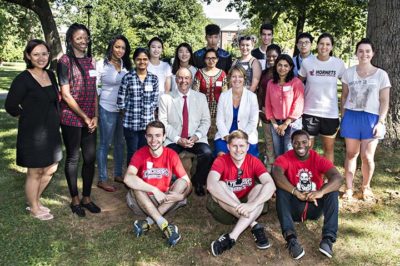 The Garrens’ willingness to be with students on that bus set a precedent. His primary focus has been helping students.
The Garrens’ willingness to be with students on that bus set a precedent. His primary focus has been helping students.
Smith recalled a time, when he was a student, that he talked to Garren in the Westover Room. During their conversation, Smith realized Garren knew he was a resident assistant, a basketball player, and a fraternity member.
“It was impressive to me that he recognized those things, because I’m just one student out of a couple thousand,” Smith said. “I wasn’t summa cum laude, I wasn’t the best athlete, I wasn’t Mr. LC. I was just a regular student, and he took notice. If he was that attentive to me, I felt like he was that attentive to everyone else.”
Carter Elliott ’19 first met Garren in the dining hall. Garren was talking to some students and one of Elliott’s friends pointed and said, “That’s our president.”
Before long, Garren sat down at Elliott’s table. “He asked who I was and said, ‘What do you think of LC so far?’” Elliott said. “He made me feel like family. … This is the type of guy we want to run our school.”
In 2013, Diana Clark ’13 was heartbroken when she got into the Skidmore College State Summer Writers’ Institute — a two-week retreat with workshops taught by renowned authors — but didn’t get a scholarship. She told the conference organizers she couldn’t come.
Then she told Dr. Laura Marello, the Lynchburg English professor who had nominated her for the conference. Marello asked the conference director to hold Clark’s place for one day while she looked for a way to cover the $2,000 fee.
“I was asking around at all sorts of different places, trying to find funding for Diana in 24 hours,” Marello said.
She emailed Garren to ask if he had any ideas. Late that night, Garren wrote back and offered to pay for it with his discretionary fund. “It was completely unexpected,” Marello said. “I was asking him for suggestions, not for money directly from him. So that was very exciting and dramatic. She got her spot back, and got to go.”
Clark said the writers’ institute helped her gain confidence in her writing skills. Today, she has a Master of Fine Arts in creative writing and is writing for a living.
Eccles said there are lots of stories like Clark’s. “Whenever there was an opportunity … to take advantage of some type of educational opportunity, especially outside of Lynchburg, [Garren] supported that 100%,” Eccles said.
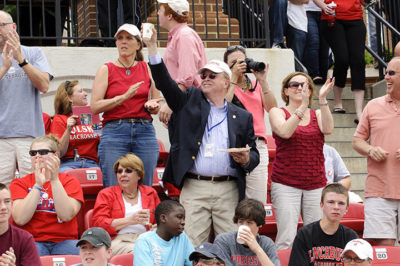 Garren understood the value of those experiences, Selden said. “Ken was a student’s president,” she said. “What truly motivated him was creating the kind of experience he wanted our students to have.”
Garren understood the value of those experiences, Selden said. “Ken was a student’s president,” she said. “What truly motivated him was creating the kind of experience he wanted our students to have.”
Top fan
During the first home women’s soccer game of 2001, Olsen looked up and saw Ken and Sheila Garren sitting on bleachers high above him. As a coach, it meant the world to him.
“It was neat to see him up in the bleachers,” Olsen said. “We saw the instant support and the buy-in, and that makes you want to work even harder.”
In addition to his presence among the fans, Garren brought optimism and enthusiasm. He inspired the coaching staff to aim higher. “He allowed us to be great,” Olsen said. “He came in and said, ‘Let’s not just be competitive, let’s win.’”
Since Garren became president, Lynchburg has won about 90 Old Dominion Athletic Conference championships — more than 40% of all conference championships in school history.
But it’s not all about winning. Abby Pyzik Smith ’04, the women’s basketball coach, said Garren’s support has been unflagging, even in the tough seasons since their 2016 ODAC championship.
“If we hit a bump in the road, he’s our biggest fan,” Smith said. “He’s always taken me under his wing in support of our program. He knows we do things the right way. We put our student-athletes first, growing them into strong women.”
She said Garren sends frequent emails of support, as well as handwritten notes after big wins or milestone moments, like a team member’s 1,000th point. “That means a lot to our players,” she said.
While some people call Garren the Hornets’ number one fan, he also takes a seat for countless other events where students perform — Ethics Bowl matches, music recitals and concerts, plays, art exhibitions.
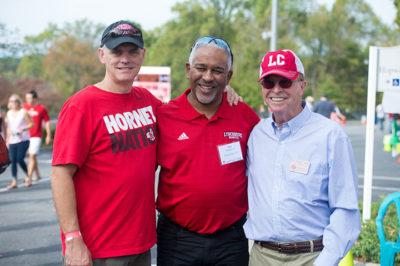 “He is our principal cheerleader,” Eccles said. “He’s the guy who was always, always holding somebody up for what they did, what they accomplished, what they gave back to the community.”
“He is our principal cheerleader,” Eccles said. “He’s the guy who was always, always holding somebody up for what they did, what they accomplished, what they gave back to the community.”
Alumni connections
Dr. Kelli Rainey ’99 has met many college presidents in her career. She has worked in higher education for more than 20 years, and today she is a consultant who helps universities with strategic planning and accreditation.
“I’ve worked with quite a few presidents where you don’t see them,” she said. “You know they’re probably off doing something, but you’re not exactly sure what that is.”
She said Garren is the exact opposite.
Rainey joined the Alumni Association Board several years ago, around the same time one of her cousins, Manal Sayed ’19, came to Lynchburg. Rainey enjoyed comparing her Lynchburg memories to her cousin’s experience.
She said she appreciates the way Garren connects with alumni to share his passion for the University and his vision for the future. “As an alum, hearing how Lynchburg was transforming, and how he was creating new programs, I knew he was doing some things thinking ahead,” Rainey said. “I’m loving the development.”
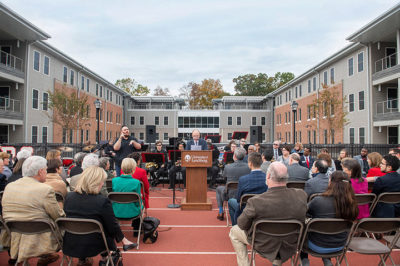 Dr. Mike Bonnette, senior vice president for advancement, has watched Garren connect with alumni at big events like Homecoming and small meetings in alumni homes. Regardless of their generation or career field, Garren helped inspire loyalty to their alma mater.
Dr. Mike Bonnette, senior vice president for advancement, has watched Garren connect with alumni at big events like Homecoming and small meetings in alumni homes. Regardless of their generation or career field, Garren helped inspire loyalty to their alma mater.
“He tries to get folks to really understand the benefit they got from their education, and how it affects their day-to-day,” Bonnette said.
Building spree
Garren inherited a campus with a lot of dreams. Centennial Hall and a new student center had been talked about for years, but there was little traction.
After more than a decade of very limited construction, “there was just a screaming need to do something,” Dr. Julius Sigler ’62, a longtime physics professor and dean, said.
Garren spearheaded the development of a master plan for facilities, and worked with the board of trustees to support the vision with financing.
Under Garren’s tenure, well over a dozen campus facilities projects have been undertaken, from the completion of Centennial Hall (now Schewel Hall) to the building of the new Westover Hall. Shellenberger Field and Moon Field both were renovated. Several buildings at the Claytor Nature Center were constructed. The University added hundreds of student rooms, helping to create a stronger residential community.
Garren has continued moving projects forward, even in his home stretch. Just this year, he helped secure a grant to match up to $150,000 in gifts for renovations to science classrooms and athletic facilities. He’s been on the road with Bonnette to meet with donors and encourage their involvement.
“We’re out talking to folks, and he’s always talking about what the next opportunity is for us and how people can be a part of it,” Bonnette said. “He tells them, ‘We want you to be a part of this because it’s going to be a great thing for our students.’”
Diplomat
When Joan Foster ’69, ’70 MAT, ’85 MEd became mayor of Lynchburg in 2006, she very quickly got an invitation for lunch with Garren. He wanted to share his vision for the College and learn about her vision for the city.
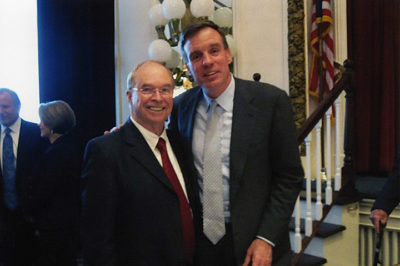 He was the only local college president who ever did that, Foster said. Garren seemed invested in the success of the University and its hometown. “He became a part of the Lynchburg community,” she said.
He was the only local college president who ever did that, Foster said. Garren seemed invested in the success of the University and its hometown. “He became a part of the Lynchburg community,” she said.
Town-gown relationships were a priority for Garren throughout his presidency. But he also has taken on the mantle of a national representative for higher education. “He’s really a diplomat for the University of Lynchburg,” Jablonski said.
In 2013, Garren learned about a proposal in the Obama administration to create a national “scorecard” of colleges. He saw quickly that it would hurt Lynchburg and its students by sending more financial aid to wealthier schools with more affluent alumni.
Garren tracked down senators, representatives, and Department of Education officials to explain how the proposal would be detrimental to students. The piece of the proposal that would have redirected financial aid money went away, but Garren continued speaking up on a host of other issues affecting higher education.
U.S. Senator Mark Warner said Garren helped him have a clearer view of several issues. “During every meeting or phone call, I was particularly impressed by Ken’s persistence and his fearless advocacy for education,” he said.
Polly Flint ’71, ’73 MEd, a former chair of the board of trustees, said Garren is relentless in advocating for the University. “He knows when he’s got somebody who is not in his corner and who needs to be there,” she said. “He gets time with them, one on one, to make the case to them. He doesn’t give up.”
Joy and pride
One Monday evening in September 2019, Garren gathered with students and staff in the new residence hall beside Shellenberger Field. They popped open a bottle of sparkling cider and enjoyed popcorn and cotton candy. Silver balloons floated above, spelling the word “HOME.”
Students had just moved into the new building a couple of days before. The building didn’t even have a name yet — it’s now Westover Hall — but the group wanted to celebrate the milestone. “There was so much joy,” Garren said, reflecting on that day.
The joy of being with students may be what Garren will miss the most when he retires. He has accomplished a lot at Lynchburg, but the memories he dwells on always connect back to students. He loves seeing the pride students take in their work. “It’s inspiring,” he said. “There are so many sources of inspiration on this campus.”
Garren takes pride in what the University of Lynchburg has been able to do with him at the helm. “I hope people know that I truly cared for it, and I was willing to do whatever it took to get things done,” he said. “In some ways, I was fearless, and would take on challenges, even at the national level, to save my school and make it thrive.
“I’m proud of what it’s done and proud of what I think it’s going to do in the future.”

